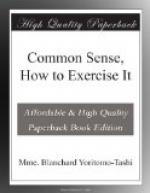“Instead of allowing it to be enlarged by touching lightly on all that which is connected with the subject, it is a question, on the contrary, of confining it to the facts relating to only one object.
“These facts should be drawn from the domain of the past; by comparison, they can be brought to the domain of the present in order to be able to associate the former phenomena with those from which it is a question of drawing deductions.
“It is rarely that these latter depend on one decision alone, even when they are presented under the form of a single negation or affirmation.
“Deduction is always the result of many observations, formulated with great exactness, which common sense binds together.
“That which is called a line of action is always suggested by the analysis of the events which were produced under circumstances analogous to those which exist now.
“From the result of these observations, the habit of thinking permits of drawing deductions and common sense concludes the analysis.
“The method of deduction rests upon this.
“One thing being equal to a previous one should produce the same effects.
“If we find ourselves faced by an incident that our memory can assimilate with another incident of the same kind, we must deduce the following chain of reasoning:
“First, the incident of long ago has entailed inevitable consequences.
“Secondly, the incident of to-day ought to produce the same effects, unless the circumstances which surround it are different.
“It is then a question of analyzing the circumstances and of weighing the causes whose manifestation could determine a disparity in the results.
“We shall interest ourselves first in the surroundings for thus, as we have said, habits of thought and feeling vary according to the epoch and the environment.
“A comparison will be established between persons or things, in order to be absolutely convinced of their degree of conformity.
“The state of mind in which we were when the previous events were manifested will be considered, and we shall not fail to ascertain plainly the similarity or change of humor at the moment as related to that of the past.
“It is also of importance to observe the state of health, for under the affliction of sickness things assume very easily a hostile aspect.
“It would be wrong to attribute to events judged during an illness the same value which is given to them at this present moment.
“When one is absolutely decided as to the relation of new perceptions and mental representations, one can calculate exactly the degree of comparison.
“The moment will then have arrived to synthesize all the observations and to draw from them the following deductions:
“First, like causes ought, all things being equal, to produce like effects.
“Secondly, the event which is in question will therefore have the same consequences as the previous one, since it is presented under the same conditions.




